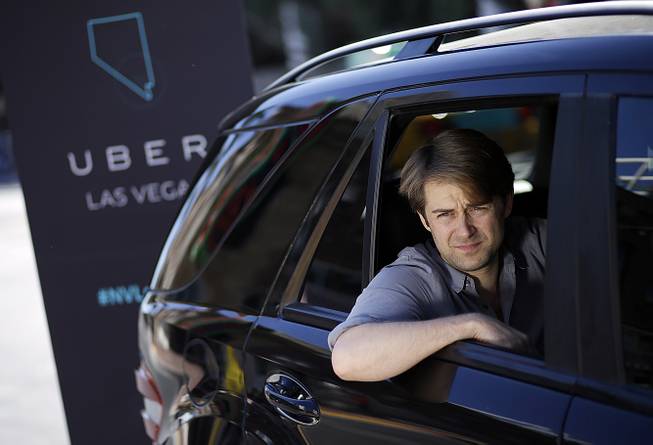
John Locher / AP
Uber West Coast Regional Manager William Barnes sits in the back of a car during a photo shoot Friday, Oct. 24, 2014, in Las Vegas. The ride sharing company has begun operations in Nevada.
Published Wednesday, Oct. 29, 2014 | 1:01 p.m.
Updated Wednesday, Oct. 29, 2014 | 2:46 p.m.
Related stories
- Uber back in court to defend its Las Vegas ride service
- Why Uber has cracked the taxi market in 70 cities — but not Las Vegas
- Judge puts the kibosh on ridesharing Uber in Nevada, for now
- Uber’s legal case against Las Vegas’ uber-powerful taxicab industry
- Multiple drivers cited within hours of Uber launch
- Judge to hear motion about Uber ride-sharing service in Las Vegas
- Vegas cab alternative runs into regulations stifling competition
Uber scored an early victory in court today when a Clark County District Court judge declined to issue a temporary restraining order that would have prevented the ride-sharing company from operating in Las Vegas.
The company’s legal battles are just beginning, though, and its drivers still face the risk of being cited and having their vehicles impounded if caught by taxicab regulators.
Here’s what happened today and what to expect next:
The hearing
Today’s hearing concerned a temporary restraining order sought by the Nevada Attorney General’s Office on behalf of the Nevada Transportation Authority and the Nevada Taxicab Authority.
If granted, the restraining order would have prohibited Uber from operating in Las Vegas until more evidence could be presented at a future hearing. A similar restraining order against Uber was approved on Tuesday by a Washoe County judge.
The arguments
The core of Senior Deputy Attorney General David Newton’s argument was that companies that offer rides for hire in Clark County must obtain a Certificate of Public Convenience and Necessity from the taxicab authority.
Obtaining the certificate comes with a variety of requirements involving how fares are charged, how drivers are screened and how vehicles are inspected and maintained.
Uber does not have the required certificate and, as such, is an unlicensed operator not allowed to conduct business in Las Vegas, Newton said.
On the other side, attorney Donald Campbell said Uber is not a transportation company but a software company. He described the company’s app, which allows users to order rides through their smartphone, as a “scaffolding” that connects riders with a network of independent drivers.
Much of the argument centered on whether the ride services made possible by Uber were being offered and advertised to the public.
Campbell argued that because users must sign up for the app, Uber’s service is being marketed only to that digital community, not the public at large.
The decision
Judge Douglas Herndon said Newton’s arguments didn’t meet the criteria needed for a temporary restraining order, which requires the plaintiff to show a reasonable chance at success in the case and that Uber’s continued operation would cause irreparable harm.
Herndon said Uber’s continued operation doesn’t pose a threat to public safety, and the company should be allowed to continue operating until the next court hearing.
Herndon didn’t make any ruling on the legality of Uber’s business model, saying “there are very good arguments to be made on both sides.”
He said this might be a case where technology is moving faster than the law and hinted action might be needed from the Legislature to update Nevada’s statutes.
What’s next
A hearing for a preliminary injunction against Uber was set for 10 a.m. Nov. 14. During that hearing, attorneys will present more evidence and likely call witnesses.
Until then, Uber can continue operating in Las Vegas, but its drivers can still be cited by regulators from the taxicab authority.
The authority cited and impounded vehicles of 15 Uber drivers in Nevada over the weekend.
Uber is not allowed to operate in Washoe County because of the temporary restraining order issued by a judge there Tuesday.
A hearing is scheduled for next week in a separate lawsuit filed against Uber by two taxi companies. It’s possible the judge could combine that case with the complaint filed by the Attorney General’s Office.

Join the Discussion:
Check this out for a full explanation of our conversion to the LiveFyre commenting system and instructions on how to sign up for an account.
Full comments policy